The Anti-Resume: How to Turn a Messy Career Into Competitive Advantage
An action plan to transform a non-linear career into your unique advantage - plus tips for visibility, positioning, and resilience.
Dear GTM Strategist!
I have a confession to make: I spent my life dreaming of being an entrepreneur.
Seriously, when I was 18, graduating from high school, I wrote this in the class yearbook:
"I want to be a successful entrepreneur and have a master's degree in business."
That was it. While other kiddos were inspired by travels and ambitions to change the world, I probably did the most boring entry that year.
But 20 years later, I am living the life I painted for myself when I was 18. Of course, there were ups and downs, but eventually I did it.
This is why I am not great at giving career advice to others. I’d literally say: “Set your eyes on something and do whatever it takes to make it happen.” Which is not actionable advice for most people.
While I have learned so much from awesome companies that I've worked for in my career, that was never my endgame. It was a stepping stone to learn, evolve, and get one step closer to my “big goal”.
I know that is not on everybody's agenda.
Not everyone wants to build their own business. Many people thrive in bigger systems, working with a team of super-smart people, or just have other life priorities.
After nearly two years of actively avoiding all career-related topics in this Substack, I invited my colleague, Harvey Lee (one of the top 10 PMMs, ex-marketing leader at Microsoft, Epson, and Virgin), to join forces and share his frameworks and blueprints for career advancement.
I think this topic matters more than ever. According to a survey published in Lenny’s Newsletter, 84% of tech workers report burnout. AI is reshaping work, but beyond the buzz, it’s a deeply human challenge.
In an age of keyword‑optimized, AI‑generated resumes, you must reclaim your story - understand and own your professional value.
Let’s hear it from Harvey.
This newsletter is sponsored by Lusha.
Lusha launches AI-powered Sales Streaming
Lusha launched a suite of AI-powered features that redefine how GTM teams research, prospect, and convert. From MCP capabilities and Conversational Intelligence to CRM-triggered recommendations and real-time enrichment, Lusha helps reps go from insight to action in one seamless flow.
At the core of all this is what Lusha has always delivered best: accurate, compliant, and continuously updated B2B data. Lusha's AI doesn’t replace the data - it’s layered on top of it to make it actionable. This ensures sellers can trust every recommendation, every insight, and every lead they surface.
These innovations are part of Lusha’s larger move toward Sales Streaming: a smarter, more connected way to sell. Instead of juggling disconnected tools, reps can now explore live signals, target the right accounts, and activate conversations in real time.
You can watch my demo of Lusha in this LinkedIn post:
The moment I knew my career advice was working wasn't in a boardroom or at a conference. It was in a dingy pub in Manchester, watching a former client celebrate landing their dream job as Head of Product at a Series B startup.
"You know what changed everything?" she said, pint in hand, eyes bright with the kind of excitement that only comes from a professional breakthrough. "It wasn't my CV. It was realising I'd been thinking about my career completely backwards."
She'd been one of those brilliant product managers trapped in the "qualifications trap"—constantly waiting to be ready, perpetually convinced she needed one more certification, one more perfect project, one more stamp of approval before she could go for what she actually wanted.
Sound familiar?
That conversation crystallised something I'd been thinking about for years: we've been sold a lie about how careers actually work. The neat progression. The linear ladder. The idea that if you just tick enough boxes and wait patiently, success will find you.
Complete bollocks.
The Great Career Myth (And Why It's Killing Your Potential)
Here's the uncomfortable truth that most career advice dances around: the people who build the most interesting careers aren't the ones with the tidiest CVs.
They're the ones who've learned to see their so-called "random" experiences as exactly what makes them valuable.
I should know. My career path looks like it was designed by someone with ADHD and a dartboard. Roadie to band manager to record label to Virgin Interactive to Xbox launch team to cybersecurity to product marketing consultant.
On paper? It's a mess. In reality? Every seemingly unrelated experience built capabilities I'd need for what came next.
The roadie work taught me crisis management and logistics. Band management taught me stakeholder coordination and negotiation. The record label taught me brand building and audience development. Gaming taught me product strategy and international market expansion. Cybersecurity taught me how to communicate complex technical concepts simply.
None of it was planned. All of it was necessary.
But here's what took me too long to realise: your "messy" career isn't a bug—it's a feature. In a world where everyone's following the same playbook, your unique combination of experiences is your competitive advantage.
Why Product People Need the Anti-Resume Mindset
If you're building products, marketing products, or founding companies, you're already living the anti-resume life—you just might not realise it.
Think about your typical week. You're translating between engineers and executives. You're synthesising user research, competitive intelligence, and business requirements into coherent strategies. You're making decisions with incomplete information under impossible deadlines.
None of that shows up cleanly on a traditional CV. But it's exactly the kind of complex, cross-functional capability that makes or breaks modern businesses.
The problem? Most people present their experience like they're applying for jobs that existed in 1995. Job title, company name, bullet points about responsibilities. Boring. Generic. Forgettable.
The anti-resume approach flips this completely. Instead of listing what you were paid to do, you showcase what you actually accomplished. Instead of hiding your non-linear journey, you highlight how it gives you perspectives others lack.
The Four Pillars of Anti-Resume Thinking
1. Position Yourself, Don't Just List Yourself
Traditional thinking: "I'm a Senior Product Manager with 5 years experience at SaaS companies."
Anti-resume thinking: "I help B2B software companies turn complex technical capabilities into compelling customer experiences that drive growth."
See the difference? The first is a job description. The second is a value proposition.
Actionable insight: Rewrite your LinkedIn headline to describe the value you create, not the role you hold. Focus on outcomes, not inputs.
2. Your "Random" Experiences Are Your Superpower
Every product leader I know has a story about how their seemingly unrelated background gave them a crucial insight. The former teacher who understands user onboarding because they know how people actually learn. The ex-consultant who can facilitate stakeholder alignment because they've navigated corporate politics. The startup founder who gets product-market fit because they've felt the pain of building something nobody wants.
Your non-obvious background isn't something to explain away—it's your differentiator.
Actionable insight: Map out your career story not as a chronological progression, but as a skill-building journey. What capabilities did each experience develop? How do they combine to create your unique perspective?
3. Start Acting Like the Next Version of Yourself
Here's the career secret that took me too long to learn: if you want to be promoted to a senior role, start doing parts of that job now.
Not all of it—you're not trying to work yourself to death doing two jobs for one salary. But the meaningful bits:
Taking initiative on cross-functional projects when everyone's talking past each other
Offering strategic perspective, not just tactical execution
Coaching more junior teammates instead of just answering their questions
Writing post-mortems that help the whole team learn, not just tick a box
Speaking up in meetings when you spot patterns others miss
Leadership isn't a role you get appointed to. It's a posture you choose to adopt.
Actionable insight: Identify one responsibility from your target role and start demonstrating it in small ways this month. Don't wait for permission—create evidence.
4. Build Your Career Insurance Policy
Smart product people don't just rely on their day job for career security. They build what I call "career insurance"—side projects, content, communities, and capabilities that exist independently of their employer.
This isn't about becoming a LinkedIn influencer or starting a startup on the side (though it could be). It's about creating optionality. When you've got something brewing beyond your job description, you negotiate from a position of strength, not desperation.
Actionable insight: Start one small project this quarter that showcases your expertise to the broader market. A newsletter, a workshop, a community contribution—something that builds your signal beyond your company walls.
Your Visibility Problem (Or: Why Your Great Work Isn't Enough)
Here's a painful truth about product and product marketing roles: some of the most valuable work you do is invisible.
Preventing disasters that never happen because you thought ahead. Simplifying complex technical requirements so teams can actually build them. Creating alignment that stops departments working against each other. Building internal processes that make everyone more effective.
None of this shows up on dashboards. None of it gets its own quarterly review metric. But it's often the difference between success and chaos.
The solution isn't to stop doing invisible work—it's to make the invisible visible.
The IMPACT Framework for showcasing intangible value:
Identify the business problem your work solves
Measure the before state to establish baselines
Position your approach to show strategic thinking
Act and document your process
Connect outcomes to measurable business results
Tell the story of what it means for the business
Instead of saying "I improved our user onboarding," try: "I redesigned our trial experience after noticing 60% of users churned in week two without completing setup. By simplifying the initial workflow and adding progressive disclosure, we increased trial-to-paid conversion by 23%, worth approximately £340K in additional quarterly revenue."
Same work. Different framing. Completely different level of recognition.
When Everything Goes Sideways (And It Will)
Let's talk about the bit most career advice glosses over: what happens when things fall apart.
Layoffs. Burnout. That creeping sense that you're in the wrong place doing the wrong things for the wrong reasons. The slow-motion career crisis that feels like being trapped in a lift that's stuck between floors.
I've been there. Twice made redundant. Multiple times burned out. Several occasions where I questioned whether I'd completely lost the plot.
But here's what I learned: these aren't career endings—they're career data points.
The key is asking the right questions:
What can I do now that I couldn't before?
What would I work on if I didn't need permission?
Who do I admire, and what about their path excites me?
When I was made redundant from a senior marketing role, my first instinct was panic. My second was relief—I no longer had to pretend to care about projects that felt meaningless. That redundancy led directly to consulting, which gave me infinitely more freedom and variety than any employed role ever could.
The RESTART framework for navigating career turbulence:
Reflect on what worked/didn't work in your previous situation
Explore new possibilities without committing immediately
Skill up in areas that interest you or show market demand
Test your assumptions through small experiments
Activate your network and start conversations
Refocus on opportunities that align with your findings
Take action on the best-fit opportunity
This turns overwhelming change into manageable steps. It's not about making dramatic leaps—it's about making informed moves.
💡 Harvey is also a Top 10 Product Marketing Consultant helping founders, PMMs, and CMOs hit their business goals. Clients like MHR Global, Basis Technologies and Preply Business rely on him — and he has one Q3 slot available. (Contact him here, no pitches, just a chat)
Building a Career That Lasts
Sustainable careers aren't built on single breakthrough moments. They're built on compound growth—showing up consistently, learning faster than your peers, adapting when the world changes.
The Career Axis Framework:
Plot yourself on two dimensions:
X-axis = Visibility (How seen is your work?)
Y-axis = Value (Are you solving important problems?)
Where you sit determines your next move:
High Value, Low Visibility = Hidden Gem. Time to speak up and ensure your contributions get proper recognition.
High Visibility, Low Value = All Show, No Substance. Time to re-anchor around real business impact.
Low Value, Low Visibility = Danger Zone. Time for a significant shift in approach or role.
High Value, High Visibility = Sweet Spot. Time to scale yourself through mentoring and bigger initiatives.
The monthly check-in questions that keep you on track:
Achievement Review:
What's the best thing I've built in the last six months?
Where am I over-performing without getting proper acknowledgement?
Growth Assessment:
What scares me in a good way right now?
What am I avoiding that I know I should tackle?
Strategic Alignment:
Who's already doing the job I want next, and what are they doing differently?
How is my role evolving, and am I evolving with it?
Relationship Mapping:
Who are the three most important relationships for my career growth?
How am I adding value to others' success?
The Side Hustle as Career Insurance
Your job pays your bills, but your work? That's bigger.
That's what you build when no one's asking. What you create during stolen hours of inspiration. What turns your experience into equity.
This doesn't have to be a startup or a content empire. It could be:
A newsletter showcasing your thinking
Community leadership that builds your network
Speaking at events (even small ones)
Mentoring that establishes your expertise
Creating frameworks others can use
The point isn't immediate income—it's building optionality. When you've got something brewing beyond your job description, you negotiate from strength, not desperation.
The 30-day side hustle challenge:
Week 1: Write one post about a lesson you've learned at work
Week 2: Offer to help someone in your network with a specific challenge
Week 3: Create one piece of content others can use (framework, template, guide)
Week 4: Start a conversation about something you're passionate about in your field
By month's end, you'll have proof you can create value outside your job description.
Asking for More (Without Getting Fired)
Most people wait for the perfect moment to ask for more responsibility, more scope, more compensation. That moment never comes.
The strategic ask framework:
Instead of: "I think I deserve a promotion"
Try: "I'd like to discuss how my role has evolved and what the next chapter looks like in terms of both scope and compensation."
The two-part formula for successful asks:
Evidence - What you've done (connected to business outcomes)
Intent - What you want next (framed as business value)
The follow-up that turns conversations into career changes:
Summarise the conversation in writing
Clarify next steps with specific timelines
Follow through exactly as promised
Update regularly on progress
This transforms you from someone who asks for things into someone who drives outcomes.
Staying Human in an Inhuman System
Here's what most career advice misses: joy isn't a bonus you add after the "real work" is done. Joy is the strategy.
Because the work will always be messy, political, high-stakes. But joy? That's what makes it sustainable.
The most effective product leaders I know aren't the ones who've optimised themselves into productivity machines. They're the ones who've figured out how to stay fully human while being supremely professional.
Micro-moments of joy that compound:
Rename your Slack channels with something that makes people smile
Celebrate small wins, not just major milestones
Use analogies that make complex concepts accessible and memorable
Create shared experiences that build team identity
Bring your personality to meetings without being unprofessional
You're not doing this to be cool. You're doing this to stay sane. And sanity, it turns out, is a competitive advantage.
Your Anti-Resume Action Plan
This week:
Rewrite your LinkedIn headline to describe value, not role
Identify one leadership opportunity to take (even small)
Ask yourself the energy audit question: What energy am I bringing to interactions?
This month:
Complete your career axis framework
Start one small project that showcases your expertise
Have one conversation with someone doing the job you want next
This quarter:
Set up your 90-day strategic review process
Build evidence for one capability from your target role
Create your first piece of career insurance
Remember: You don't need permission to start becoming the next version of yourself. You don't need perfect conditions or complete clarity about where you're heading.
You just need to start. Messily, imperfectly, authentically.
Because here's the truth that took me forty years to learn: the people who build careers that matter aren't the ones with the tidiest paths. They're the ones who refuse to be invisible, who turn their weird combinations of experience into competitive advantages, who understand that showing up consistently beats waiting for permission every single time.
The stage is set. The lights are up. Your unique combination of experiences, perspectives, and capabilities is exactly what the world needs—even if you can't see it yet.
Time to stop waiting for someone else to write your story and start headlining your own career.
The encore's already yours. All that's left is to walk out there and show them what you're made of.
Harvey Lee spent the early part of his career humping amplifiers for rock bands and the rest launching technology products across global markets. His new book "The Anti-Resume" publishes next year. You can find him dispensing stellar career advice and get his first book for $0 via his free newsletter at https://harvey-lee.com/.
📘 New to GTM? Learn fundamentals. Get my best-selling GTM Strategist book that helped 9,500+ companies to go to market with confidence - frameworks and online course included.
✅ Need ready-to-use GTM assets and AI prompts? Get the 100-Step GTM Checklist with proven website templates, sales decks, landing pages, outbound sequences, LinkedIn post frameworks, email sequences, and 20+ workshops you can immediately run with your team.
🏅 Are you in charge of GTM and responsible for leading others? Grab the GTM Masterclass (6 hours of training, end-to-end GTM explained on examples, guided workshops) to get your team up and running in no time.
🤝 Want to work together? ⏩ Check out the options and let me know how we can join forces.





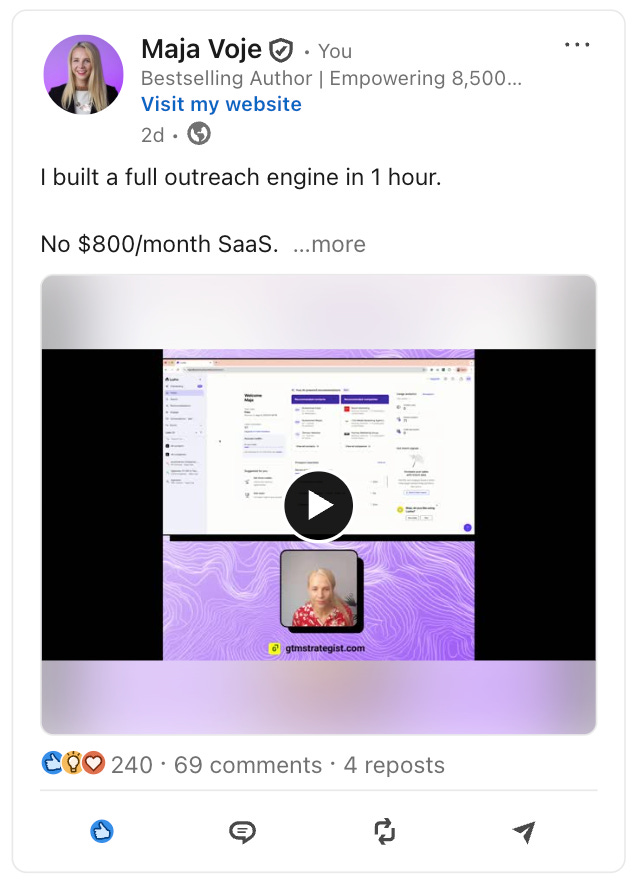

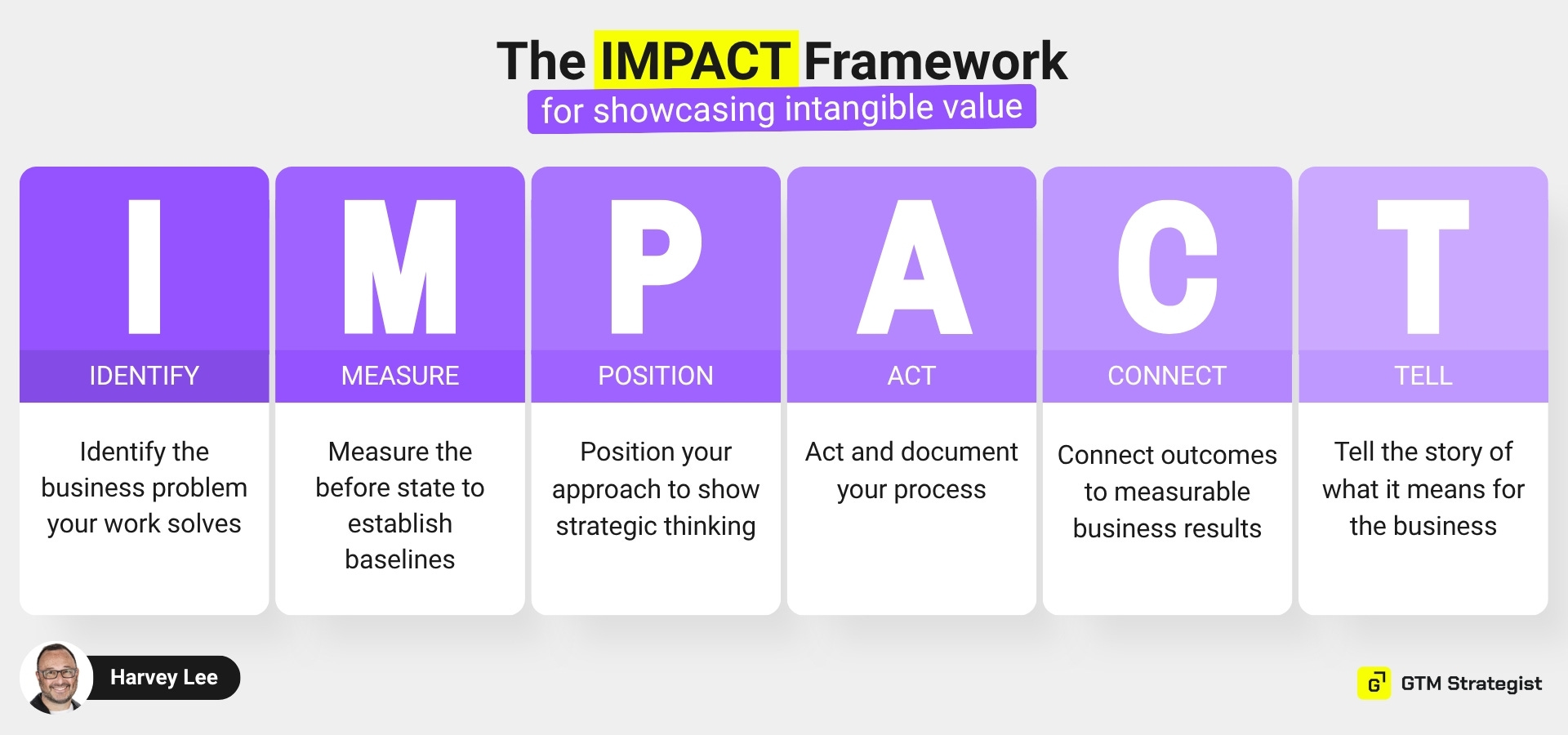
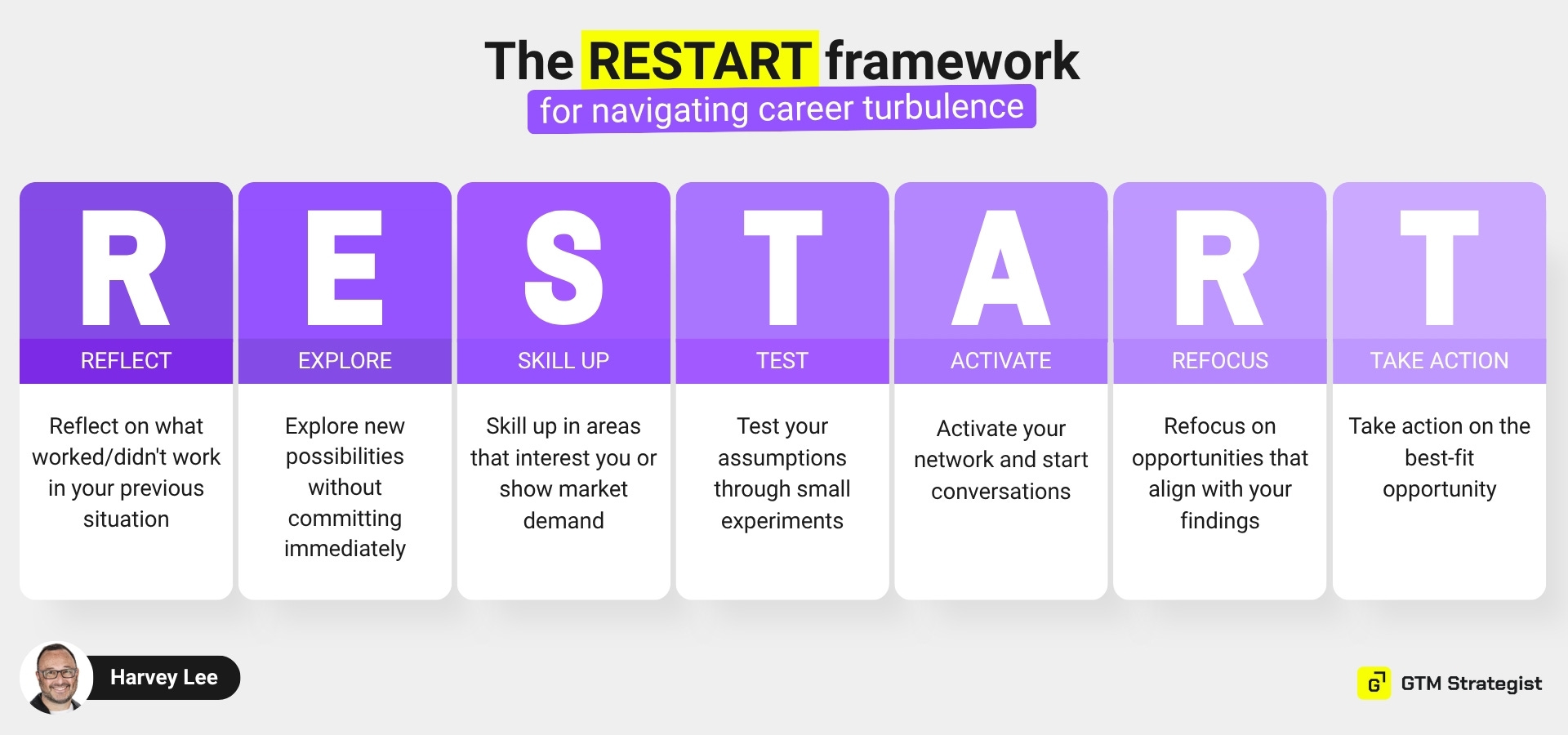

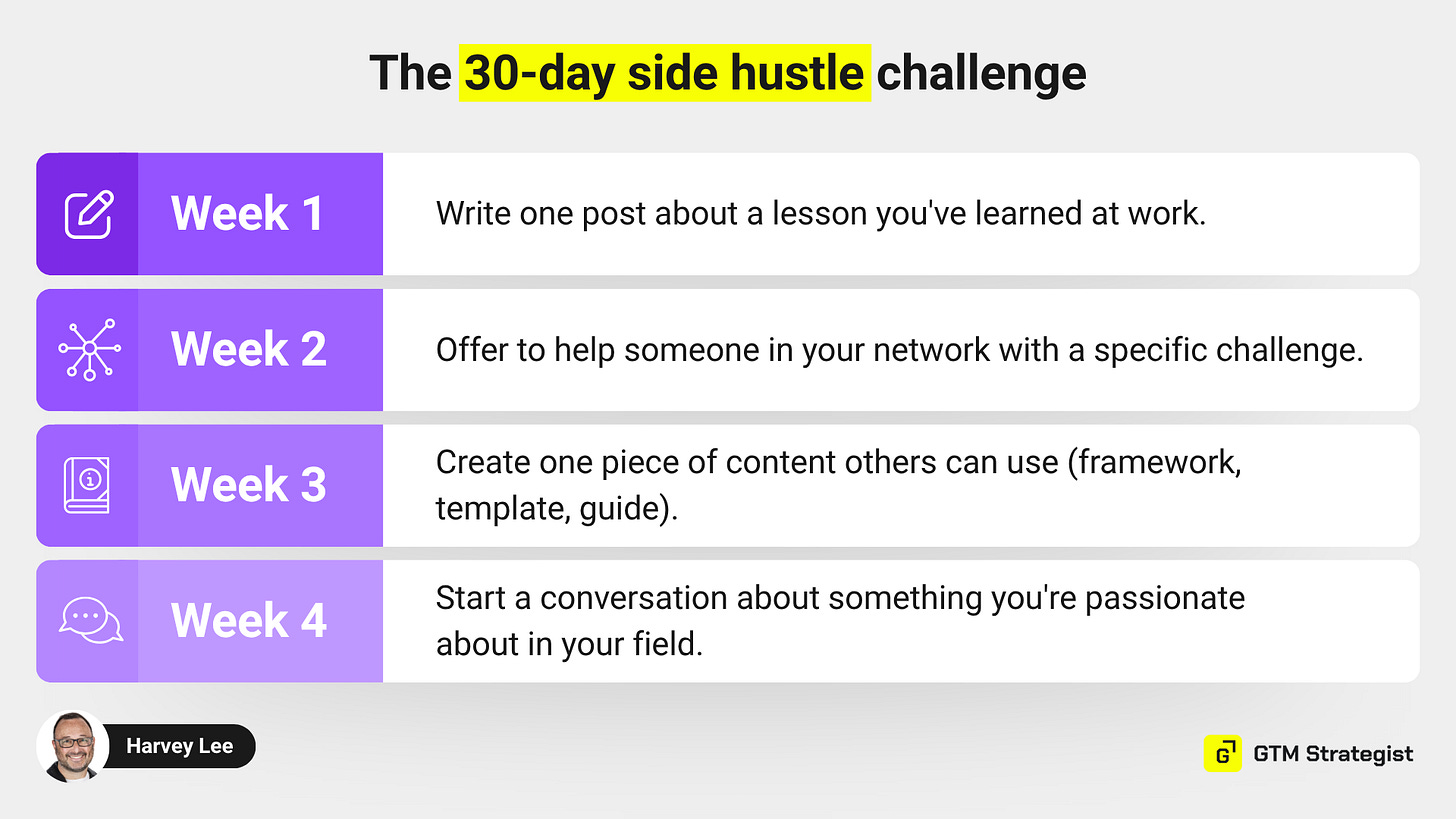
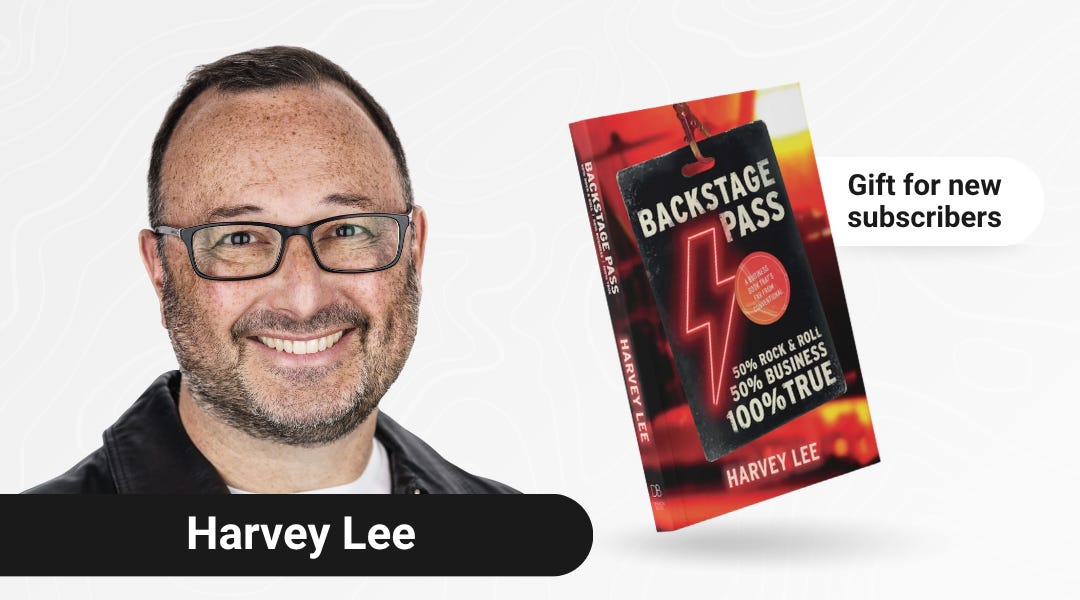
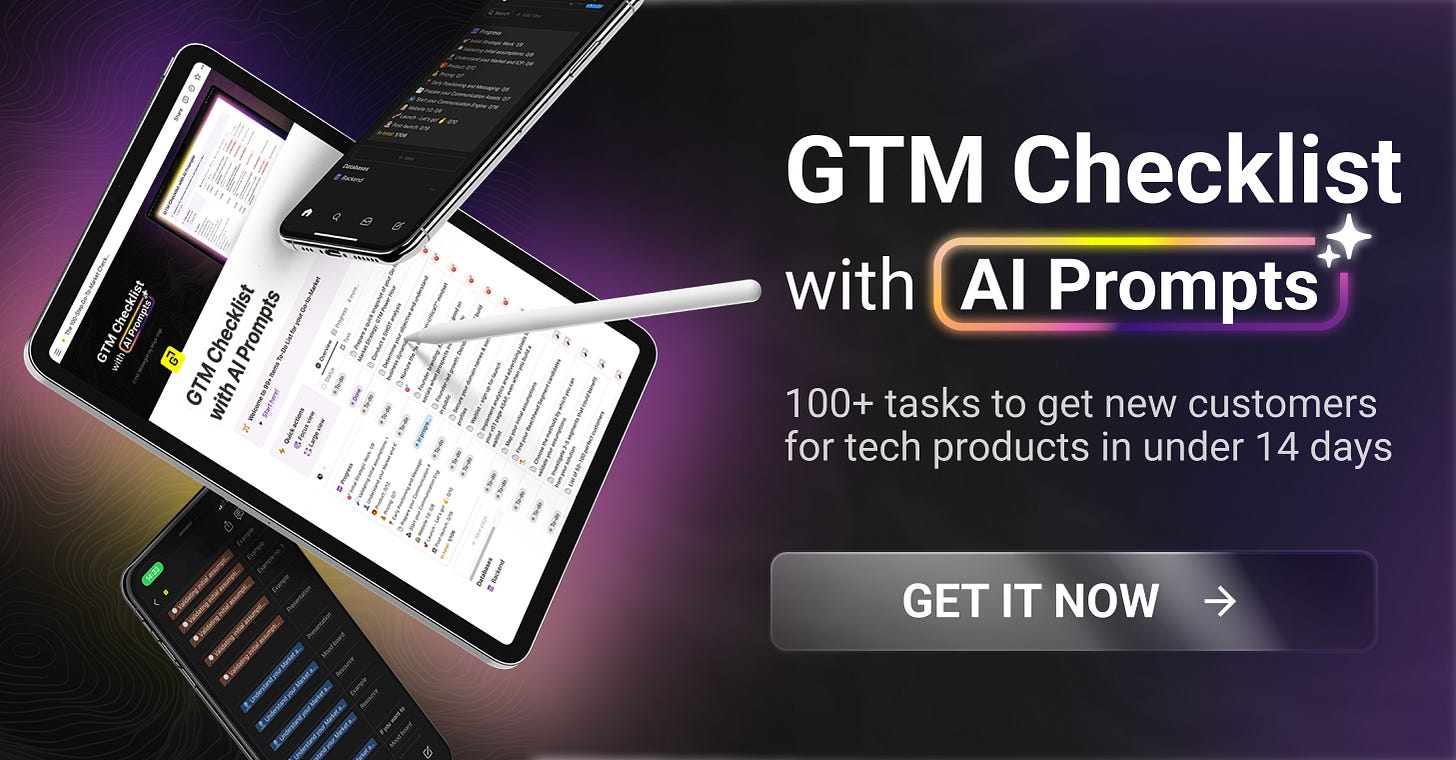

Thanks for sharing this. It resonates, because I indeed I always cared about getting s**t done, at the expense of visibility... and it is something I'd like to change. And I just started a substack about Growth: product-, business- (org), and personal-related growth. These are topics I am passionate about. And I write about them without seeking any validation. It's just me.
This is really great for generalists who like to try a bit of everything. Great tips here!